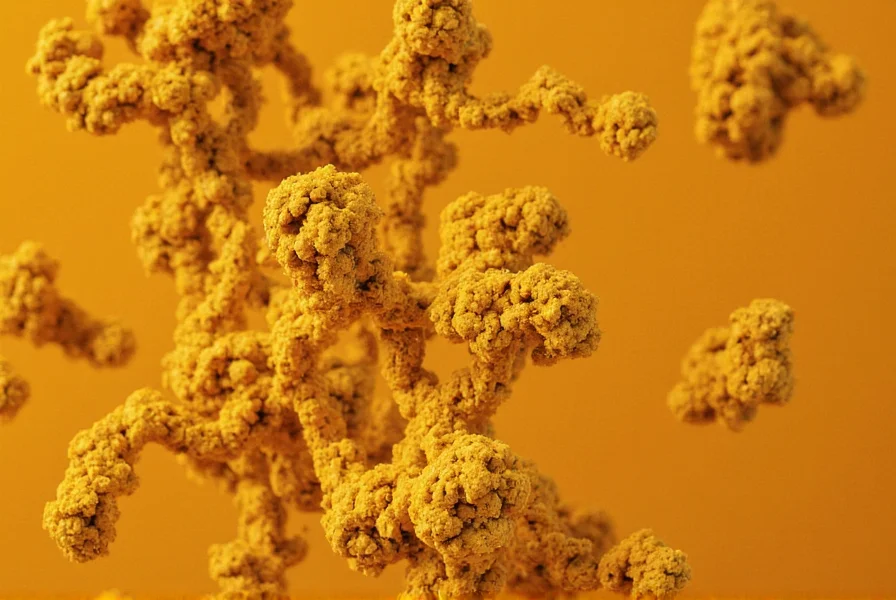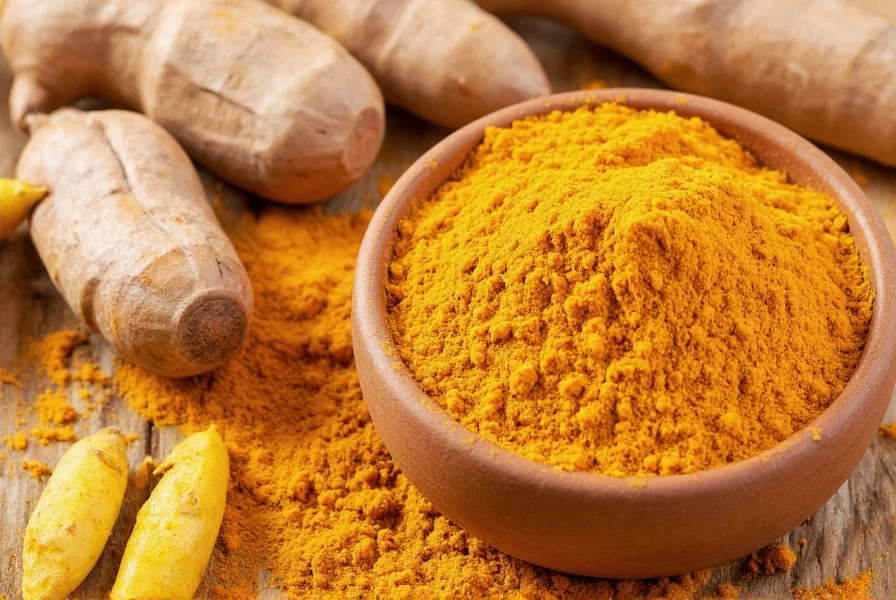For centuries, traditional medicine systems have utilized turmeric for its healing properties. Modern science now validates many of these historical uses, particularly regarding inflammation. Chronic inflammation underlies numerous health conditions, making natural anti-inflammatory options increasingly valuable. This article examines the scientific evidence behind turmeric's anti-inflammatory effects, dosage considerations, and practical applications based on current research.
The Science Behind Turmeric's Anti-Inflammatory Effects
Turmeric (Curcuma longa) contains curcuminoids, with curcumin (diferuloylmethane) being the most biologically active compound. Curcumin works through multiple mechanisms to combat inflammation:
- Inhibits nuclear factor-kappa B (NF-kB), a protein complex that triggers inflammatory gene expression
- Reduces levels of pro-inflammatory cytokines including TNF-α, IL-1, and IL-6
- Suppresses cyclooxygenase-2 (COX-2) and lipoxygenase (LOX) enzymes involved in inflammation
- Modulates signaling pathways like JAK-STAT and MAPK that regulate immune responses
Unlike pharmaceutical anti-inflammatories that typically target a single pathway, curcumin's multi-target approach may provide broader anti-inflammatory effects with potentially fewer side effects. However, this complex mechanism also makes research more challenging as scientists work to understand exactly how turmeric reduces inflammation in different conditions.

Clinical Evidence for Turmeric Anti-Inflammatory Benefits
Multiple human studies support turmeric's anti-inflammatory properties across various health conditions:
| Condition Studied | Study Details | Key Findings |
|---|---|---|
| Osteoarthritis | 12-week RCT with 367 participants | 1,500 mg/day curcumin reduced pain scores by 58% compared to 37% with placebo (p<0.01) |
| Rheumatoid Arthritis | 8-week study with 45 participants | 500 mg curcumin twice daily showed greater improvement in joint swelling and tenderness than diclofenac sodium |
| Post-Exercise Muscle Damage | Double-blind trial with 35 athletes | 400 mg curcumin daily reduced muscle soreness by 46% and accelerated recovery markers |
| Metabolic Syndrome | 8-week trial with 117 participants | 1,000 mg curcumin daily significantly reduced CRP, a key inflammation marker, by 37% |
Research on turmeric for inflammation shows promising results, but effectiveness varies by condition and individual factors. A 2022 meta-analysis published in Nutrients concluded that curcumin supplementation significantly reduced inflammatory markers across multiple studies, though the authors noted considerable heterogeneity in study designs and outcomes.
Optimizing Turmeric Absorption for Maximum Anti-Inflammatory Effects
One major limitation of turmeric is its poor bioavailability. Curcumin has low solubility in water and undergoes rapid metabolism and elimination. Several strategies can enhance turmeric's anti-inflammatory benefits:
- Piperine combination: Adding 20 mg of piperine (from black pepper) increases curcumin absorption by up to 2,000% by inhibiting metabolic enzymes
- Fat-soluble delivery: Consuming turmeric with healthy fats (like olive oil or avocado) improves absorption as curcumin is fat-soluble
- Heated preparation: Cooking turmeric in liquid increases solubility; traditional golden milk recipes leverage this principle
- Specialized formulations: Some supplements use phospholipid complexes, nanoparticles, or other technologies to enhance bioavailability
When considering how to take turmeric for inflammation, consistency matters more than single high doses. Regular daily intake maintains steady curcumin levels in the bloodstream, providing more consistent anti-inflammatory effects than sporadic high doses.
Turmeric vs Conventional Anti-Inflammatory Medications
Many people wonder how turmeric compares to pharmaceutical anti-inflammatory options. Research suggests:
- Curcumin shows comparable effectiveness to ibuprofen for osteoarthritis pain relief in some studies, with potentially fewer gastrointestinal side effects
- Unlike NSAIDs which primarily inhibit COX enzymes, curcumin works through multiple pathways, potentially offering broader anti-inflammatory effects
- Turmeric generally has fewer side effects than long-term NSAID use, though high doses may cause mild digestive issues in some people
- Pharmaceuticals typically provide faster symptom relief, while turmeric's effects build gradually with consistent use
It's important to note that turmeric shouldn't replace prescribed medications without consulting a healthcare provider. Those considering turmeric anti-inflammatory supplements alongside medications should discuss potential interactions with their doctor.
Safety Considerations and Practical Recommendations
While turmeric is generally safe, certain considerations apply when using it for inflammation:
- Dosage: Most clinical trials use 500-2,000 mg of curcumin daily. Higher doses don't necessarily provide additional benefits and may increase side effect risk
- Timing: Taking turmeric with meals enhances absorption and reduces potential digestive discomfort
- Drug interactions: Turmeric may interact with blood thinners, diabetes medications, and certain chemotherapy drugs
- Contraindications: People with gallbladder issues, bleeding disorders, or scheduled surgery should consult a doctor before using turmeric supplements
For those seeking natural anti-inflammatory options, incorporating turmeric into the diet provides additional benefits beyond curcumin. Whole turmeric contains other beneficial compounds and nutrients. Adding 1-2 teaspoons of turmeric to meals, combined with black pepper and healthy fats, offers a practical approach to harnessing turmeric's anti-inflammatory properties.
Limitations of Current Research
While evidence supporting turmeric's anti-inflammatory effects continues to grow, several limitations exist:
- Many studies have small sample sizes or short durations
- Standardization issues: Turmeric products vary widely in curcumin content and formulation
- Most research focuses on isolated curcumin rather than whole turmeric
- Long-term safety data for high-dose supplementation remains limited
- Individual responses vary significantly based on genetics and health status
Future research needs to address these gaps to provide clearer guidance on optimal turmeric usage for specific inflammatory conditions. Until then, a balanced approach that combines turmeric with other anti-inflammatory lifestyle factors offers the most comprehensive strategy.
Conclusion
Turmeric demonstrates significant potential as a natural anti-inflammatory agent, supported by growing scientific evidence. Its multi-target mechanism offers advantages over single-pathway pharmaceuticals, though bioavailability challenges require strategic consumption approaches. When incorporated thoughtfully into a comprehensive anti-inflammatory lifestyle, turmeric can provide meaningful benefits for many seeking natural approaches to managing inflammation. As with any supplement, individual responses vary, and consultation with healthcare providers remains essential, particularly for those with existing health conditions or taking medications.
How long does it take for turmeric to reduce inflammation?
Most clinical studies show measurable reductions in inflammatory markers within 4-8 weeks of consistent daily use. Individual responses vary, with some noticing benefits in 2-3 weeks while others may require 2-3 months. Regular daily intake is crucial as curcumin doesn't accumulate significantly in the body.
What's the most effective form of turmeric for inflammation?
The most effective forms combine curcumin with absorption enhancers. Products containing 95% curcuminoids plus piperine (black pepper extract) generally show the best results in clinical trials. Some advanced formulations use phospholipid complexes or nanoparticles to further improve bioavailability. For dietary use, cooking turmeric with black pepper and healthy fats provides good absorption.
Can turmeric replace my anti-inflammatory medication?
Turmeric should not replace prescribed anti-inflammatory medications without consulting your healthcare provider. While research shows turmeric has anti-inflammatory properties, it works differently than pharmaceuticals and may not provide sufficient relief for serious inflammatory conditions. Some people successfully use turmeric alongside medications, but potential interactions require medical supervision.
Does cooking turmeric destroy its anti-inflammatory properties?
No, cooking actually enhances turmeric's anti-inflammatory benefits. Heating turmeric in liquid increases curcumin's solubility and bioavailability. Traditional preparations like golden milk leverage this principle. However, extremely high temperatures for prolonged periods may degrade some compounds, so moderate cooking is optimal.
Are there any side effects of taking turmeric for inflammation?
Turmeric is generally well-tolerated, but some people experience mild digestive issues like nausea or diarrhea at high doses (typically above 2,000 mg curcumin daily). Turmeric may interact with blood thinners and diabetes medications. Those with gallbladder issues should consult a doctor before using turmeric supplements. Dietary amounts from cooking are typically safe for most people.











 浙公网安备
33010002000092号
浙公网安备
33010002000092号 浙B2-20120091-4
浙B2-20120091-4